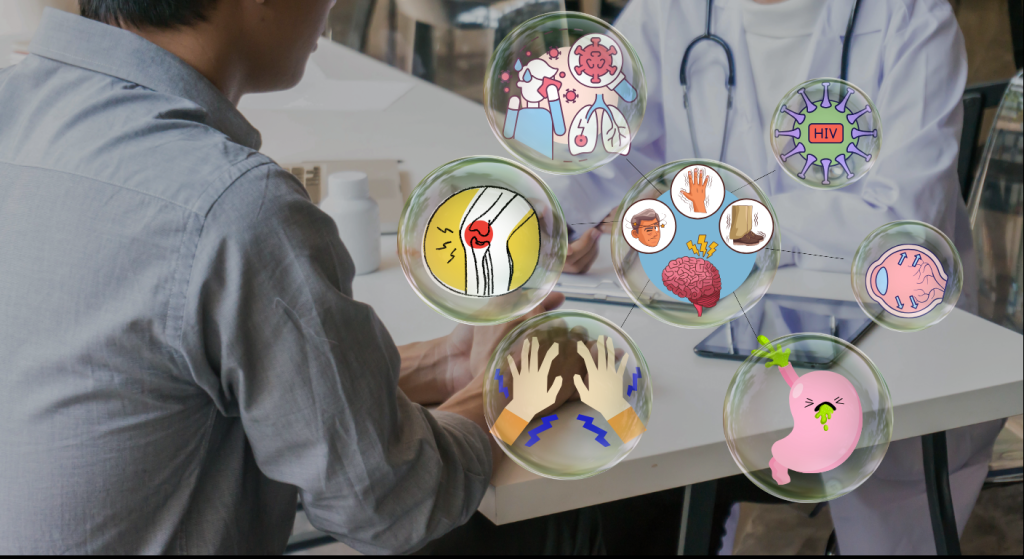Introduction: Understanding Medical Marijuana
Medical cannabis is now legal in many U.S. states for patients who meet the qualifying conditions medical marijuana. Even though it is still controlled by federal law, many states allow patients to use cannabis if they meet certain criteria. A key part of these programs is “qualifying conditions.” These are the illnesses or symptoms a patient must have to get a state-issued medical marijuana card.
This article explains qualifying conditions, lists common ones, shows how to get a medical card, provides a state guide, and covers benefits.
Qualifying Conditions Medical Marijuana
When we say qualifying conditions for medical marijuana, we mean the illnesses or symptoms that a state allows for its medical cannabis card. In other words, if a patient has one of these conditions or gets treatments that cause certain symptoms, they may be able to get a medical marijuana card.
Each state has its own list of qualifying conditions. Some list specific illnesses like cancer, glaucoma, or HIV/AIDS. Others use broader terms like “chronic pain” or allow other conditions approved by the state health department. Because the rules are different in each state, it’s important to check your state’s list.
Here is a common list of 17 qualifying medical conditions.
Common 17 Qualifying Medical Conditions

Here are 17 frequently listed conditions that often appear among eligibility criteria for medical cannabis. (Note: inclusion in this list does not guarantee eligibility in a given state, check state law.)
- Chronic Pain
- Cancer
- Epilepsy & Seizure Disorders
- Post-Traumatic Stress Disorder (PTSD)
- Multiple Sclerosis (MS)
- Glaucoma
- Crohn’s Disease
- Parkinson’s Disease
- HIV/AIDS
- Alzheimer’s Disease
- Severe Nausea
- Muscle Spasms
- Wasting Syndrome
- Anxiety
- Insomnia
- Arthritis
- Migraines
These 17 qualifying conditions medical marijuana show what most state medical marijuana programs commonly cover. However, many states add more conditions, let doctors approve other illnesses, or give physicians some discretion. For example, Florida’s list includes chronic non-malignant pain, glaucoma, HIV, epilepsy, and migraines.
How Can I Get a Prescription for Medical Cannabis?

If you’re wondering how to get medical cannabis, here’s a generalized step-by-step overview of the process under many state programs. (Always check your specific state’s rules.)
- See a qualified doctor – Visit a doctor or licensed health provider who can approve medical cannabis in your state. They will check your condition and see if it matches the state’s qualifying conditions.
- Get your diagnosis or medical proof – Your doctor may need proof of your illness or symptoms, like cancer, MS, seizures, or chronic pain.
- Fill out the state application – Most states ask you to submit an application to the medical cannabis program. This usually includes personal information, your doctor’s certification, proof of residency, and sometimes a fee.
- Get your medical cannabis card – After approval, the state will give you a card that lets you buy medical cannabis legally.
- Go to an authorized dispensary – Use your card to purchase products, following state rules for limits and types of cannabis.
- Follow ongoing rules – Some states ask you to renew your card, get periodic doctor check-ups, or provide updates if your condition changes.
What Conditions Qualify for a Medical Marijuana Card?
Generally:
- Check your state rules – Look at your state’s medical marijuana laws to see if you can get a medical card.
- Condition must qualify – Your illness should be on the state’s list or a doctor must say it’s serious enough to use medical cannabis.
- Symptoms matter – The condition usually causes symptoms like pain, nausea, muscle spasms, seizures, weight loss, or nerve problems.
- Meet other rules – You must meet state requirements like living in the state, being the right age, and having no disqualifying criminal record in some states.
- Doctor approval – A doctor must confirm that using medical cannabis is likely safer and more helpful than harmful for you.
Explore Your State’s Medical Marijuana Laws →
The card serves as proof that you have met eligibility, enabling you to legally access medical cannabis under state protections and receive associated benefits.
State-by-State Breakdown: Qualifying Conditions Medical Marijuana

Below is a sampling of states where medical (and/or recreational) cannabis is legal, highlighting some of their qualifying conditions.
Alabama
State law lists conditions including cancer-related weight loss, chronic pain, nausea or vomiting, cachexia/wasting syndrome, PTSD, depression, Crohn’s disease, epilepsy, autism spectrum disorder, HIV/AIDS weight loss/ nausea, panic disorder, Parkinson’s disease.
Alaska
Alaska’s program includes cachexia/wasting syndrome, cancer, chronic pain, glaucoma, HIV or AIDS, multiple sclerosis, nausea, persistent muscle spasms, seizures.
Arizona
Arizona’s list: Alzheimer’s disease, ALS, cachexia/wasting syndrome, cancer, chronic pain, Crohn’s disease, glaucoma, hepatitis C, HIV/AIDS, nausea, persistent muscle spasms, PTSD, seizures.
Arkansas
Amyotrophic Lateral Sclerosis (ALS / Lou Gehrig’s Disease), Alzheimer’s Disease, Cachexia or Wasting Syndrome, Cancer, Chronic or Debilitating Disease, Crohn’s Disease, Fibromyalgia, Glaucoma, Hepatitis C, HIV/AIDS, Intractable Pain, Multiple Sclerosis, Peripheral Neuropathy, PTSD, Seizures, Severe Arthritis, Severe Nausea, Severe and Persistent Muscle Spasms, Tourette’s Syndrome, Ulcerative Colitis, Any Medical Condition or Its Treatment Approved by the Department of Health.
California
Anorexia, Arthritis, Cachexia or Wasting Syndrome, Cancer, Chronic Pain, HIV/AIDS, Glaucoma, Migraine, Persistent Muscle Spasms, Severe Nausea, Seizures, Any Debilitating Illness Where the Medical Use of Marijuana Has Been Deemed Appropriate and Recommended by a Physician.
Colorado
An Autism Spectrum Disorder, Any Condition for Which a Physician Would Prescribe an Opioid, Cachexia or Wasting Syndrome, Cancer, Chronic Pain, Chronic Nervous System Disorders, Glaucoma, HIV/AIDS, Nausea, Persistent Muscle Spasms, Post-Traumatic Stress Syndrome, Seizures.
Connecticut
Amyotrophic Lateral Sclerosis (ALS / Lou Gehrig’s Disease), Cachexia or Wasting Syndrome, Cancer, Cerebral Palsy, Chronic Neuropathic Pain Associated with Degenerative Spinal Disorders, Chronic Pain of at Least Six Months Duration Associated with a Specified Underlying Chronic Condition Refractory to Other Treatment Intervention, Chronic Pancreatitis, Complex Regional Pain Syndrome, Crohn’s Disease, Cystic Fibrosis, Ehlers-Danlos Syndrome Associated with Chronic Pain, Epilepsy, Glaucoma, HIV or AIDS, Hydrocephalus with Intractable Headache, Interstitial Cystitis, Intractable Neuropathic Pain That Is Unresponsive to Standard Medical Treatments, Intractable Spasticity, Intractable Headache Syndromes, Irreversible Spinal Cord Injury with Objective Neurological Indication of Intractable Spasticity, MALS Syndrome (Median Arcuate Ligament Syndrome), Movement Disorders Associated with Huntington Disease, Multiple Sclerosis, Muscular Dystrophy, Neuropathic Facial Pain, Osteogenesis Imperfecta, Parkinson’s Disease or other medical conditions that may be approved by the physician
Delaware
Autism with Self-Injurious or Aggressive Behavior, Alzheimer’s Disease, Amyotrophic Lateral Sclerosis (ALS / Lou Gehrig’s Disease), Cachexia or Wasting Syndrome, Cancer, Chronic Debilitating Migraines, Chronic Pain, Decompensated Cirrhosis, Glaucoma, HIV/AIDS, Intractable Epilepsy, Multiple Sclerosis, Nausea, Post-Traumatic Stress Disorder (PTSD), Seizures, Severe and Persistent Muscle Spasms, Terminal Illness.
Florida
Amyotrophic Lateral Sclerosis (ALS / Lou Gehrig’s Disease), Cancer, Crohn’s Disease, Chronic Nonmalignant Pain, Epilepsy, Glaucoma, HIV/AIDS, Multiple Sclerosis, Muscle Spasms, Parkinson’s Disease, Post-Traumatic Stress Disorder (PTSD), Seizures, Terminal Illness (Patients Diagnosed with No More Than 12 Months to Live), Other Debilitating Medical Conditions Comparable to Those Enumerated.
Georgia
AIDS, Alzheimer’s Disease, Amyotrophic Lateral Sclerosis (ALS / Lou Gehrig’s Disease), Autism, Cancer, Crohn’s Disease, Epidermolysis Bullosa, Hospice Care Patients, Intractable Pain, Mitochondrial Disease, Multiple Sclerosis, Parkinson’s Disease, Post-Traumatic Stress Disorder (PTSD), Severe or End-Stage Peripheral Neuropathy, Seizure Disorder, Sickle Cell Disease, Tourette’s Syndrome.
Hawaii
Amyotrophic Lateral Sclerosis (ALS / Lou Gehrig’s Disease), Cachexia or Wasting Syndrome, Cancer, Chronic Pain, Crohn’s Disease, Epilepsy, Glaucoma, HIV or AIDS, Lupus, Multiple Sclerosis, Nausea, Persistent Muscle Spasms, Post-Traumatic Stress Disorder (PTSD), Rheumatoid Arthritis, Seizures.
Illinois
Autism, Alzheimer’s Disease, Amyotrophic Lateral Sclerosis (ALS / Lou Gehrig’s Disease), Anorexia Nervosa, Arnold Chiari Malformation, Cachexia / Wasting Syndrome, Cancer, Causalgia, Chronic Inflammatory Demyelinating Polyneuropathy, Complex Regional Pain Syndrome Type 2 (CRPS), Crohn’s Disease, Dystonia, Ehlers-Danlos Syndrome, Fibromyalgia, Fibrous Dysplasia, Glaucoma, Hepatitis C, HIV/AIDS, Hydrocephalus, Hydromyelia, Interstitial Cystitis, Irritable Bowel Syndrome (IBS), Lupus, Migraines, Multiple Sclerosis, Muscular Dystrophy, Myasthenia Gravis, Myoclonus, Nail-Patella Syndrome, Neurofibromatosis, Neuropathy, Osteoarthritis, Parkinson’s Disease, Polycystic Kidney Disease (PKD), Post-Traumatic Stress Disorder (PTSD), Reflex Sympathetic Dystrophy (RSD), Residual Limb Pain, Rheumatoid Arthritis, Seizures, Sjogren’s Syndrome, Spinal Cord Disease, Spinocerebellar Ataxia (SCA), Superior Canal Dehiscence Syndrome, Syringomyelia, Tarlov Cysts, Tourette’s Syndrome, Traumatic Brain Injury and Post-Concussion Syndrome, Ulcerative Colitis.
Iowa
AIDS/HIV, Amyotrophic Lateral Sclerosis (ALS / Lou Gehrig’s Disease), Cancer, Cancer-Related Chronic Pain, Nausea, or Cachexia, Corticobasal Degeneration, Crohn’s Disease, Multiple Sclerosis, Parkinson’s Disease, Post-Traumatic Stress Disorder, Intractable Epilepsy, Seizures, Severe Intractable Autism with Self-Injurious or Aggressive Behaviors, Terminal Illness, Ulcerative Colitis, Untreatable Pain.
Louisiana
Autism Spectrum Disorders, Cachexia or Wasting Syndrome, Cancer, Crohn’s Disease, Epilepsy, Glaucoma, HIV/AIDS, Intractable Pain, Muscular Dystrophy, Multiple Sclerosis, Parkinson’s Disease, Post-Traumatic Stress Disorder (PTSD), Seizure Disorders / Spasticity, Severe Muscle Spasms.
Maine
Alzheimer’s Disease, Amyotrophic Lateral Sclerosis (ALS / Lou Gehrig’s Disease), Cachexia or Wasting Syndrome, Cancer, Chronic Pain, Crohn’s Disease, Epilepsy, Glaucoma, Hepatitis C, HIV or AIDS, Huntington’s Disease, Inflammatory Bowel Disease, Multiple Sclerosis, Nausea, Nail-Patella Syndrome, Parkinson’s Disease, Post-Traumatic Stress Disorder (PTSD).
Maryland
Cachexia or Wasting Syndrome, Anorexia, Chronic Pain, Glaucoma, Nausea, Post-Traumatic Stress Disorder, Seizures, Severe or Persistent Muscle Spasms, A Chronic Medical Condition That Is Severe and for Which Other Treatments Have Been Ineffective.
Massachusetts
Amyotrophic Lateral Sclerosis (ALS), Anxiety, Cachexia or Wasting Syndrome, Cancer, Crohn’s Disease, Glaucoma, HIV or AIDS, Hepatitis C, Multiple Sclerosis, Parkinson’s Disease, Post-Traumatic Stress Disorder (PTSD), Other Conditions as Determined in Writing by a Qualifying Practitioner.
Michigan
Autism, Alzheimer’s Disease, Amyotrophic Lateral Sclerosis (ALS or Lou Gehrig’s Disease), Arthritis, Cachexia or Wasting Syndrome, Cancer, Cerebral Palsy, Chronic Pain, Colitis, Crohn’s Disease, Glaucoma, HIV or AIDS, Hepatitis C, Inflammatory Bowel Disease (IBD), Nail-Patella, Nausea, Obsessive-Compulsive Disorder (OCD), Parkinson’s Disease, Post-Traumatic Stress Disorder (PTSD), Rheumatoid Arthritis, Seizures, Severe and Persistent Muscle Spasms, Spinal Cord Injury, Tourette’s Disease, Ulcerative Colitis.
Minnesota
The qualifying conditions for medical marijuana include Alzheimer’s Disease, Amyotrophic Lateral Sclerosis (ALS or Lou Gehrig’s Disease), Autism, Cancer, Chronic Motor or Vocal Tic Disorder, Chronic Pain, Crohn’s Disease, Epilepsy, Glaucoma, HIV/AIDS, Inflammatory Bowel Disease (IBD), Intractable Pain, Multiple Sclerosis, Obstructive Sleep Apnea, Post-Traumatic Stress Disorder (PTSD), Seizures, Severe and Persistent Muscle Spasms, Sickle Cell Disease, Terminal Illness, and Tourette’s Syndrome.
Mississippi
The qualifying conditions for medical marijuana include Alzheimer’s Disease, Amyotrophic Lateral Sclerosis (ALS / Lou Gehrig’s Disease), Autism, Cachexia or Wasting Syndrome, Cancer, Crohn’s Disease, Chronic Pain, Dementia, Diabetic or Peripheral Neuropathy, Glaucoma, HIV/AIDS, Hepatitis, Huntington’s Disease, Multiple Sclerosis, Muscular Dystrophy, Pain Refractory to Appropriate Opioid Management, Parkinson’s Disease, Post-Traumatic Stress Disorder (PTSD), Seizures, Severe and Persistent Muscle Spasms, Severe or Intractable Nausea, Spastic Quadriplegia, Spinal Cord Disease or Severe Injury, Sickle-Cell Anemia, and Ulcerative Colitis.
Missouri
A chronic medical condition that is normally treated with prescription medications that could lead to physical or psychological dependence, Alzheimer’s Disease, Amyotrophic Lateral Sclerosis (ALS / Lou Gehrig’s Disease), Autism, Cachexia or Wasting Syndrome, Cancer, Chronic Pain, Crohn’s Disease, Debilitating Psychiatric Disorders, Epilepsy, Glaucoma, Hepatitis C, HIV/AIDS, Huntington’s Disease, Inflammatory Bowel Disease (IBD), Intractable Migraines Unresponsive to Other Treatment, Multiple Sclerosis, Neuropathies, Parkinson’s Disease, Post-Traumatic Stress Disorder (PTSD), Sickle Cell Anemia, Seizures, Severe, Persistent Muscle Spasms, Terminal Illness, Tourette’s Syndrome.
Montana
A CNS disorder that results in muscle spasms or painful or chronic spasticity, Cachexia or Wasting Syndrome, Cancer, Chronic Inflammatory Demyelinating Polyneuropathy, Crohn’s Disease, Epilepsy or an Intractable Seizure Disorder, Glaucoma, HIV/AIDS, Hospice Care, Multiple Sclerosis, Post-Traumatic Stress Disorder (PTSD), Severe Nausea or Pain.
Nevada
Anxiety, Anorexia Nervosa, Autism Spectrum Disorder, Autoimmune Disease, Cachexia or Wasting Syndrome, Cancer, Chronic Pain, Dependence upon or Addiction to Opioids, Epilepsy, Glaucoma, HIV/AIDS, Multiple Sclerosis, Muscle Spasms, Nausea, Neuropathy, Post-Traumatic Stress Disorder (PTSD), Seizures.
New Hampshire
Amyotrophic Lateral Sclerosis (ALS / Lou Gehrig’s Disease), Alzheimer’s Disease, Cachexia or Wasting Syndrome, Cancer, Chemotherapy-Induced Anorexia, Chronic Pain That Has Not Responded to Previously Prescribed Medication, Chronic Pancreatitis, Crohn’s Disease, Ehlers-Danlos Syndrome, Elevated Intraocular Pressure, Epilepsy, Glaucoma, Hepatitis C, HIV/AIDS, Lupus, Moderate to Severe Vomiting, Multiple Sclerosis, Muscular Dystrophy, Nausea, Parkinson’s Disease, Persistent Muscle Spasms, Post-Traumatic Stress Disorder (PTSD), Seizures, Spinal Cord Injury or Disease, Terminal Illness, Traumatic Brain Injury, Ulcerative Colitis.
New Jersey
Qualifying conditions for medical marijuana are Amyotrophic Lateral Sclerosis (ALS/ Lou Gehrig’s Disease), Anxiety, Cachexia or Wasting Syndrome, Cancer, Chronic Pain, Crohn’s disease, Dysmenorrhea, Epilepsy, Glaucoma, HIV/AIDS, Inflammatory Bowel Disease (IBD), Intractable skeletal or muscular spasticity, Migraines, Multiple Sclerosis, Muscular Dystrophy, Nausea, Opioid use disorder, Post-Traumatic Stress Disorder (PTSD), Seizures, Tourette’s Syndrome, Terminal illness as determined by a physician.
New Mexico
Alzheimer’s Disease, Amyotrophic Lateral Sclerosis (ALS/ Lou Gehrig’s disease), Anorexia, Autism Spectrum Disorder, Cachexia or Wasting Syndrome, Cancer, Chronic pain, Crohn’s disease, Damage to the Nervous Tissue of the Spinal Cord, Epilepsy, Friedreich’s Ataxia, Glaucoma, Hepatitis C, HIV/AIDS, Hospice patients, Huntington’s disease, Inclusion Body Myositis, Inflammatory Autoimmune-mediated Arthritis, Intractable nausea/vomiting, Lewy Body Disease, Multiple sclerosis, Obstructive Sleep Apnea, Opioid Use Disorder, Painful Peripheral Neuropathy, Parkinson’s disease, Post-traumatic Stress Disorder (PTSD), Seizures, Spasmodic Torticollis (Cervical Dystonia), Spinal Muscular Atrophy, Ulcerative Colitis.
New York
Physicians and other medical practitioners can prescribe medical cannabis for any condition if they believe that cannabis is an appropriate treatment.
North Carolina
CBD oil use is allowed; currently no medical conditions or physician recommendation is required to purchase CBD.
North Dakota
Agitation from Alzheimer’s Disease or Related Dementia, Amyotrophic Lateral Sclerosis (ALS/ Lou Gehrig’s Disease), Anorexia Nervosa, Anxiety Disorder, Autism Spectrum Disorder, Brain Injury, Bulimia Nervosa, Cachexia or Wasting Syndrome, Cancer, Chronic or Debilitating Disease, Crohn’s Disease, Ehlers-Danlos Syndrome, Endometriosis, Epilepsy, Fibromyalgia, Glaucoma, Hepatitis C, HIV/AIDS, Interstitial Cystitis, Intractable Nausea, Neuropathy, Migraine, Multiple Sclerosis, Post-Traumatic Stress Disorder (PTSD), Rheumatoid Arthritis, Seizures, Severe and Persistent Muscle Spasms, Severe Debilitating Pain, Spinal Stenosis, Tourette’s Syndrome.
Ohio
Alzheimer’s Disease, Amyotrophic Lateral Sclerosis (ALS/ Lou Gehrig’s Disease), Cachexia or Wasting Syndrome, Cancer, Chronic Traumatic Encephalopathy, Crohn’s Disease, Epilepsy, Fibromyalgia, Glaucoma, Hepatitis C, HIV/AIDS, Huntington’s Disease, Inflammatory Bowel Disease, Multiple Sclerosis, Pain that is Chronic and Severe or Intractable, Parkinson’s Disease, Post-Traumatic Stress Disorder (PTSD), Seizures, Sickle Cell Anemia, Spasticity, Spinal Cord Disease or Injury, Terminal Illness, Tourette’s Syndrome, Traumatic Brain Injury, Ulcerative Colitis.
Oklahoma
Anxiety Disorders, Body Aches, Cachexia or Wasting Syndrome, Cancer, Depression, Epilepsy, Glaucoma, HIV/AIDS, Inflammation, Loss of Appetite, Migraines, Muscle Pain, Nausea, Neuropathic Pain Disorders, Seizures.
Oregon
Alzheimer’s Disease, Cachexia or Wasting Syndrome, Cancer, Chronic Pain, Glaucoma, HIV or AIDS, Nausea, Persistent Muscle Spasms, Post-Traumatic Stress Disorder (PTSD), Seizures, Other Conditions Subject to Approval.
Pennsylvania
Amyotrophic Lateral Sclerosis (ALS/ Lou Gehrig’s Disease), Anxiety Disorders, Autism, Cancer, Crohn’s Disease, Damage to the Nervous Tissue of the Central Nervous System (brain-spinal cord), Dyskinetic and Spastic Movement Disorders, Epilepsy, Glaucoma, HIV/AIDS, Huntington’s Disease, Inflammatory Bowel Disease (IBD), Intractable Seizures, Intractable Spasticity, Multiple Sclerosis, Neurodegenerative Diseases, Neuropathies, Opioid Use Disorder, Parkinson’s Disease, Post-Traumatic Stress Disorder (PTSD), Severe Chronic or Intractable Pain, Sickle Cell Anemia, Terminal Illness, Tourette’s Syndrome.
Rhode Island
Alzheimer’s Disease, Cachexia or Wasting Syndrome, Cancer, Chronic Pain, Crohn’s Disease, Epilepsy, Glaucoma, Hepatitis C, HIV/AIDS, Multiple Sclerosis, Nausea, Persistent Muscle Spasms, Post-Traumatic Stress Disorder, Seizures, Other Conditions Subject to Approval.
South Carolina
A Condition Causing a Person to Be Homebound That Includes Severe or Persistent Nausea, A Chronic Medical Condition Causing Severe and Persistent Muscle Spasms, Autism, Cachexia or Wasting Syndrome, Cancer, Crohn’s Disease, Chronic Medical Condition for Which an Opioid Is or Could Be Prescribed Based on Standards of Care, Multiple Sclerosis, Neurological Disease or Disorder (Including Epilepsy), Post-Traumatic Stress Disorder, Sickle Cell Anemia, Terminal Illness, Ulcerative Colitis.
South Dakota
Amyotrophic Lateral Sclerosis (ALS/ Lou Gehrig’s Disease), Cachexia or Wasting Syndrome, Cancer, Chronic Pain, Crohn’s Disease, Epilepsy, Glaucoma, HIV/AIDS, Multiple Sclerosis, Nausea or Severe Vomiting, Post-Traumatic Stress Disorder (PTSD), Seizures.
Tennessee
Only CBD oil allowed; qualifying conditions not specified.
Texas
Alzheimer’s Disease, Amyotrophic Lateral Sclerosis (ALS/ Lou Gehrig’s Disease), Cancer and Related Conditions, Crohn’s Disease, Epilepsy, HIV/AIDS, Inflammatory Bowel Disease (IBD), Multiple Sclerosis, Parkinson’s Disease, Seizures, Sickle Cell Disease, Ulcerative Colitis, An Incurable Neurodegenerative Disease, Autism, Post-Traumatic Stress Disorder (PTSD), Spasticity, Terminal Cancer.
Utah
Alzheimer’s Disease, Amyotrophic Lateral Sclerosis (ALS/ Lou Gehrig’s Disease), Autism, Cachexia or Wasting Syndrome, Cancer, Chronic Pain, Crohn’s Disease, Epilepsy, HIV/AIDS, Hospice Patient, Multiple Sclerosis, Nausea, Persistent and Debilitating Muscle Spasms, Post-Traumatic Stress Disorder (PTSD), Rare Condition or Disease Affecting Less Than 200,000 Individuals in the U.S., Seizures, Terminal Illness, Ulcerative Colitis.
Vermont
Cachexia or Wasting Syndrome, Cancer, Crohn’s Disease, Epilepsy, Glaucoma, HIV/AIDS, Multiple Sclerosis, Parkinson’s Disease, Post-Traumatic Stress Disorder (PTSD), Seizures, Severe or Chronic Pain, Severe Nausea.
Virginia
Alzheimer’s Disease, Amyotrophic Lateral Sclerosis (ALS/ Lou Gehrig’s Disease), Anxiety, Autism, Cachexia or Wasting Syndrome, Cancer, Chronic Pain, Crohn’s Disease, Epilepsy, Fibromyalgia, Hepatitis C, Huntington’s Disease, Inflammatory Bowel Disease (IBD), Multiple Sclerosis, Parkinson’s Disease, Post-Traumatic Stress Disorder (PTSD), Seizures, Sickle Cell Anemia, Tourette’s Syndrome.
Washington
Anorexia Nervosa, Appetite Loss, Cachexia or Wasting Syndrome, Cancer, Chronic Renal Failure Requiring Hemodialysis, Crohn’s Disease, Epilepsy, Glaucoma, Hepatitis C, HIV/AIDS, Intractable Pain, Multiple Sclerosis, Nausea, Persistent Muscle Spasms or Spasticity, Post-Traumatic Stress Disorder (PTSD), Seizures, Traumatic Brain Injury, Any Terminal or Debilitating Condition.
West Virginia
Amyotrophic Lateral Sclerosis (ALS/ Lou Gehrig’s Disease), Cancer, Crohn’s Disease, Epilepsy, HIV/AIDS, Huntington’s Disease, Intractable Seizures, Intractable Spasticity, Multiple Sclerosis, Neuropathy, Parkinson’s Disease, Post-Traumatic Stress Disorder (PTSD), Severe Chronic or Intractable Pain, Spinal Cord Damage, Sickle Cell Anemia, Terminal Illness.
Wisconsin
Any Medical Condition for Which a Patient Receives the Proper Doctor Recommendations.
Wyoming
Intractable Epilepsy.
Washington, D.C.
Any Condition for Which Treatment with Medical Marijuana Would Be Beneficial, as Determined by the Patient’s Physician.
Reasons to Get a Medical Marijuanas Card
Here are some of the principal motivations:
- Legal protection: Your medical card shows you are a patient under state law, reducing the chance of legal trouble for using prescribed cannabis.
- Access to dispensaries: Cardholders can visit state-licensed dispensaries with products made for medical use, including different doses and strengths.
- Medical guidance & dosage control: Doctors and dispensaries help guide proper dosing and treatment for your condition.
- Cost benefits: Some states offer lower taxes, higher-potency products, or priority access for medical patients.
- Focused treatment: The program is for patients with specific health needs, ensuring guidance and care under the medical cannabis framework.
Benefits of Having a Medical Card
The following are the cannabis card benefits:
- Official patient status: Being registered gives you legal protections that recreational users don’t have.
- Access to medical products: Cardholders can get higher-strength cannabis and special forms like oils, tinctures, or topicals.
- Medical guidance: Your doctor helps make sure cannabis fits safely into your overall treatment plan.
- Lower taxes and fees: Some states charge less for medical patients than recreational users.
- Priority access: During shortages or program openings, medical patients may get first access.
- Peace of mind: You know your use is legal and medically supervised, reducing worries about legality or work/travel issues.
What Qualifies You for Medical Marijuana?
It involves both medical and administrative factors:
- Medical condition: You need one of the health problems listed as qualifying conditions for medical marijuana by your state or approved by a doctor, like cancer, MS, seizures, or chronic pain.
- Serious symptoms: The condition usually must cause strong symptoms, like severe pain, muscle spasms, nausea, wasting, or not responding to other treatments.
- Doctor approval: A healthcare provider must confirm your condition and say that using medical cannabis is likely safer than harmful for you.
- State rules: You usually must live in the state, meet age rules (often 18+, but minors may qualify with a caregiver), fill out the application, pay any fees, and follow state laws.
- Follow the law: Once you get a card, you need to follow the state’s rules about dispensaries, product types, dosage, and renewals.
Final Thoughts
Medical cannabis can help people with serious or long-term health problems. “Qualifying conditions” are the illnesses or symptoms that let a patient get a medical marijuana card. Many states list common conditions like cancer, chronic pain, seizures, or MS, but each state is different.
If you want a medical card, here’s what to do: check your state’s list of qualifying conditions for medical marijuana, talk to a licensed doctor for certification, and apply through your state’s program. Because laws and rules are different in each state, it’s important to get clear information and professional advice.
Get Your Medical Marijuana Card Today →
What conditions qualify for a medical card?
Qualifying conditions for a medical marijuana card vary by state. Common qualifying conditions medical marijuana programs recognize include chronic pain, cancer, epilepsy or seizure disorders, multiple sclerosis (MS), glaucoma, Crohn’s disease, Parkinson’s disease, HIV/AIDS, PTSD, severe nausea, muscle spasms, and wasting syndrome. Some states also allow physician discretion for other debilitating conditions.
Can a non-US citizen get a medical marijuana card?
Eligibility rules differ by state. Many states require applicants to be legal residents with proof of residency. Non-US citizens may qualify in some states if they meet residency requirements and provide necessary documentation. Always check your state’s rules regarding qualifying conditions medical marijuana.
How to get a medical marijuana card online same day?
LeafyRX allows patients to get a same-day medical marijuana card online in states where telemedicine certification is allowed. You can consult a licensed provider and receive your approval quickly, often the same day. This applies to patients who meet the qualifying conditions medical marijuana requirements.
What is medical marijuana best for?
Medical marijuana is commonly used to relieve chronic pain, reduce inflammation, control nausea and vomiting (especially from chemotherapy), treat muscle spasms, manage seizures, improve appetite in wasting syndromes, and alleviate anxiety or PTSD symptoms. These are some of the main qualifying conditions medical marijuana programs focus on.
Medical use of marijuana’s pros and cons
Pros: Relief from chronic pain, reduced nausea, muscle spasm management, improved appetite, an alternative to opioids, and potential relief for anxiety or PTSD.
Cons: Possible side effects include dizziness, dry mouth, altered mental state, dependency risk, interaction with other medications, and legal limitations depending on state laws.















